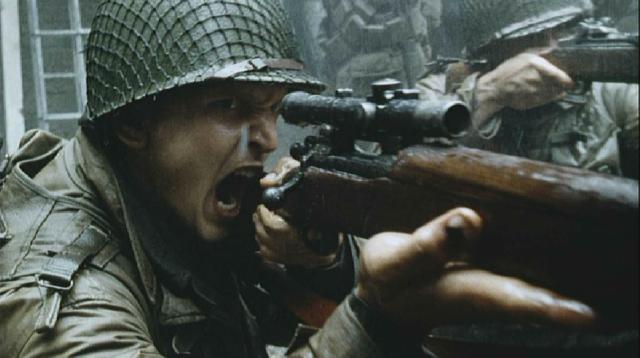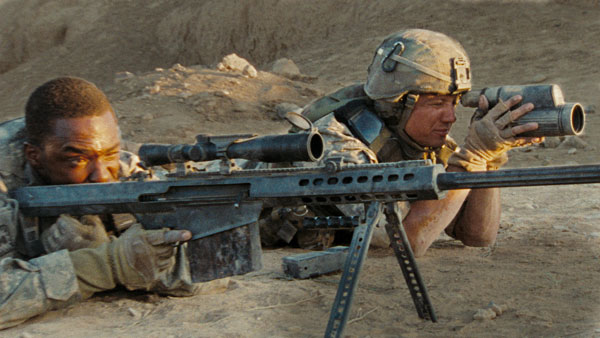I'm currently writing an article on war films for student-led e-magazine The Back Seat and it got me thinking - do different rules apply to "modern" war films that don't apply to, say - stories about the Battle of Agincourt? If a film were to appear that portrayed Hitler as a stand-up guy doing the decent thing and ridding the world of all those horrible Jews, there would definitely be an outcry (and rightly so!) *
But what makes a brilliant war film? I don't imagine people typically enjoying Saving Private Ryan in the sense that you'd smile and walk away feeling all warm inside. However, I'm sure most would agree that it's a brilliant piece of cinema.
 How can you possibly decide what a good war film is? If it portrays things as accurately as possible, does that make it "better"? Does that mean that Tarantino's Inglourious Basterds is complete tosh simply because it gets Hitler's death ever so slightly wrong? Does fact = good? Apparently, the American public were genuinely shocked and appalled by what they saw in mini-series Generation Kill:
How can you possibly decide what a good war film is? If it portrays things as accurately as possible, does that make it "better"? Does that mean that Tarantino's Inglourious Basterds is complete tosh simply because it gets Hitler's death ever so slightly wrong? Does fact = good? Apparently, the American public were genuinely shocked and appalled by what they saw in mini-series Generation Kill:There seemed to be this huge revelation that not all soldiers are respectful, honourable gentlemen - some may not even be nice! Some are sexist, racist and they actually want to kill! I was annoyed C4 picked up Generation Kill, only to slot it in late night after True Blood and not once did I see a single advert for the series. That makes me wonder - did they believe it would be in bad taste to advertise a war series that - rather than showing conflict in a purely negative, thought-provoking light - actually portrays war how it is - ambiguous and on occasion a positive experience?
 Kid In The Front Row says some interesting things about the responsibility of film makers:
Kid In The Front Row says some interesting things about the responsibility of film makers:As fictional writers and directors; we are able to have a dramatic impact on audiences. Right now, films like the Harry Potter Series and 'Twilight' are watched and loved by millions of teenagers worldwide. Do the makers of these films have only the need to entertain, or is there a responsibility regarding the message and intended meaning of these films?Anyway, I don't want to get too bogged down in responsibility, but I am interested in what you think makes a great war film!
So what is it? I'm a huge fan of the genre, mainly because it provides a unique opportunity to tell stories that would simply be impossible in any other medium. There is the issue that people (particularly males between the ages of 12 and 18) will find war "cool." If I watch the sniper scene in Saving Private Ryan, I can't help but think to myself - "that's pretty awesome!" Does that make me a bad person? Does it make me a good person because I cry a little bit when Wade dies in the same film?
So people - what is your favourite war film and why? What makes a war film truly spectacular? I'm really eager to find out what other people think about this issue!

* No offence intended, I'm merely making a point.

1 comment:
Of my favourite war movies, I tend to like the true story stuff. The Longest Day and A Bridge Too Far both adapted from a war correspondent, Cornelius Ryan's books being pretty accurate because of their source material. The Battle of Britain is also a classic big ensemble piece (made by the James Bond movie team). Dunkirk is also a good one directed by Leslie Norman (Barry's dad). I think I prefer them because there is less larger than life "heroism" depicted in them (although you could argue that anyone who jumped from a plane/landing craft/climbed into a cockpit was performing heroic deeds). Memphis Belle gets an honourable mention too, depicting scared young men, just doing their job.
Of the fictional war movies, Das Boot is excellent. Once again, no "heroics" but the fear and misery of the sailors is centrepiece to the film. On the whole, I tend to watch fictitious war movies as an action film, rather than anything to be taken seriously. Pretty much what Tarantino has done quite purposefully with Inglourious Basterds; stereotypical characters, and the US win the war with a bit of help from the British, the only sympathetic characters being the Jewish woman and the black projectionist. In many ways he's showing the crassness of making an adventurous action movie out of real-life misery. But we're human and enjoy good versus evil in whatever setting.
Post a Comment